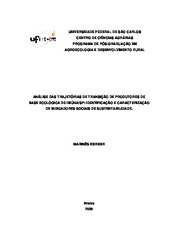Análise das trajetórias de transição de produtores de base ecológica de Ibiúna/SP: identificação e caracterização de indicadores sociais de sustentabilidade
Abstract
The present work has the objective to contribute with the quarrel on the support of Brazilian familiar agriculture, by means of the reconstruction of the trajectories of transition of familiar producers and the identification of social pointers of support, based on participative principles. The case study it was carried through in the agricultural community of the Verava, city of Ibiúna/SP, where familiar agriculturists had adhered to the way of production of ecological base, motivated for the necessity of improvement of the income conditions. To understand this process it was integrated, in the analysis, the vision of the agriculturists of the searched universe. Such boarding allowed to catch the dynamics, the moment-key of the transition process, the advances and the challenges in the scope of the local development; it brought to elements that they make possible to evidence that the agriculturists had had similar sociocultural contexts and few variations in the productive structure and the familiar logics. One concludes that the trajectories of transition and the pointers of support are influenced by the professional experience, cultural patrimony, public politics, type of social organization and type of insertion in markets, influencing the quality of life of the agriculturists and local social justice. E the research generated a set of knowledge that will be able to serve of subsidy for the formularization of public politics.
